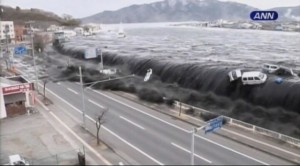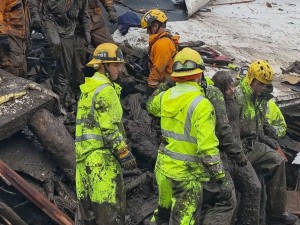
Jamaica’s Ability to Respond to Natural Disasters Is Almost Non-Existent
January 11th, 2018
On Tuesday night, while many of us were tucked up in bed, a tsunami alert for Jamaica and other islands went out, triggered by a huge earthquake between Honduras and the Cayman Islands, for an hour or so; it was then discontinued. The next day, there were some careless and downright silly comments on social media. There were assertions that neither Kingston nor Jamaica itself was actually at risk from a tsunami anyway, and that Jamaica is lucky (or “blessed”) because it always escapes natural disasters. Jamaica, no problem!
The fact is that the official response was dismal. Many Jamaicans knew nothing about the alert until the next morning. Some were awoken in the middle of the night by alarmed friends and relatives living overseas, who had seen the news on the media. Others shared anxious messages on WhatsApp, wondering what to do. Only the Prime Minister and Kingston’s Mayor Delroy Williams (we are especially grateful to the latter) kept us informed via Twitter (but then, how many Jamaicans are on Twitter?) Most media houses had closed down their newsrooms and gone home for the night. They do not have the resources for CNN-style “24/7″ coverage. Only one or two radio stations managed to catch the news.
Did the emergency services alert us in any way to the possibility of a tsunami? Is there even any warning system in place? The answer to both those questions appears to be “no.” By the time Wednesday morning dawned, if the tsunami had arrived, we would all have been washed away. According to calculations, it would have taken just 45 minutes to reach us.
45 minutes. Let that sink in. That is barely enough time to get to higher ground, if you are living in Portmore or downtown Kingston, for example.

A scene from the film “The Impossible” – the true story of a family on vacation in Bali, which was hit by a tsunami.
I would advise you to watch the film The Impossible, the dramatisation of a family’s miraculous survival after the tsunami in Indonesia. It’s a true story. For more gritty reality, I’d advise you to look up the terrifying footage of tsunamis in Japan, for example. In 2011, many thousands died amidst great destruction; but a video noted that the death toll would have been much higher if the area had not had a “sophisticated” alert system.

A still from footage of a tsunami in Japan, about to overwhelm a town. Many of the residents did not have time to reach higher ground.
Let’s remind ourselves that disasters like this are not amusing or titillating. They are serious business.
This brings me to the issue of climate change. I just read another headline from the Los Angeles Times: “Urgent Alerts About Deadly Mudslides Came Too Late for Montecito Victims.” The good citizens of California have suffered from one natural disaster after another in the past couple of years: from drought to terrible wildfires, and now mudslides, with the death toll still rising. These things don’t just happen in “developing” countries. They happen in countries with pretty strong infrastructure and reliable systems in place. Still, things can go wrong.

Firefighters rescue a 14-year-old girl trapped inside a destroyed home during heavy rains in Montecito, Calif., Jan. 9, 2018. Heavy rains overnight combined with large areas burned by the Thomas Fire combined for flash flooding and mudslide risk.
Mike Eliason/Santa Barbara County Fire via EPA
I heard urgency in Member of Parliament Daryl Vaz’s voice as he described the devastation caused – not for the first time – by heavy rains in the Rio Grande Valley and elsewhere in the parish of Portland. This evening, I spoke with environmentalist Peter Espeut and Stephen Shaw of the National Works Agency about the situation. What to do? Mr. Vaz pointed out, a note of desperation in his voice, that to coin a phrase “We can’t go on like this.” I empathised with him. Mr. Shaw could not begin to put a figure on the amount of money spent on work done to fix the almost continuous infrastructure problems in the area.
I am going to sound like a “prophet of doom,” but is there any indication that things are going to get any better? I think not. Climate change gallops inexorably along, apparently faster and faster, building up speed (just like a tsunami). Areas like the Rio Grande Valley will become uninhabitable – and probably sooner, rather than later. Is it even worth pouring more money into futile engineering works?
Some of us are facing it, head on. Others just don’t understand what is happening – like a woman who commented on the television “It’s a mystery!” as she watched a landslide carrying palm trees and banana plants down into the road in front of her. Others still are pretending that it’s not happening; and many of them are people who should know better. Those people worry me the most.
Where is the urgency? “If you cry wolf, people stop listening,” said one emergency responder in California.
But I am afraid Jamaica hasn’t reached that stage yet. We’re not ready.
Tags: California, Climate Change, Daryl Vaz, disaster preparedness, drought, earthquake, floods, Jamaica, Japan, Kingston, landslides, Los Angeles Times, Mayor Delroy Williams, Office of Disaster Preparedness and Emergency Management, Portland, Rio Grande Valley, The Impossible, tsunami, Twitter, United States
The Gleaner reserves the right not to publish comments that may be deemed libelous, derogatory or indecent.
To respond to The Gleaner please use the feedback form.
4 Responses to “Jamaica’s Ability to Respond to Natural Disasters Is Almost Non-Existent”
- We Are the Zoomers
- Living Online with Humans and Birds: NAOC 2020
- Human Trafficking and the Problem of Public Education
- Down Memory Lane
- Are We Ready to Recover from COVID-19?
- Road Safety Matters: Is Your Vehicle Safe?
- Sexual Harassment, Me Too, and the Minister’s Disturbing Giggle
- The Vulnerable Senior Citizens, Private Care Homes and COVID-19
- A Muddle Over Masks
- Here is Something Life-Saving You Can Do: Give Blood!



We do need a rethink. It also demonstrated that while social media has been a wonderful addition to our lives there is still a role for media. ODPEM also needs to rethink its communication strategy
Yes, agreed. In fact the emergency services need to use every possible medium to get their messages across. Social media is one of several useful tools!
[…] there was the “tsunami scare.” You can read my comments on this for Gleaner Blogs here; and a broader Caribbean perspective I put together for Global Voices here. Several Caribbean […]
[…] Climate Change: There will be $412 million in the kitty for coastal protection – plus $75.3 million to protect our fishers from the ravages of climate change (funded by the Adaptation Fund and Inter-American Development Bank, respectively). Additionally, the Urban Development Corporation (UDC) will manage an additional $1.29 billion contingency fund for the possibility of natural disasters, including $500 million under the four-year Jamaica Disaster Vulnerability Reduction Project. That project includes three new fire stations and seismic stations. I don’t understand what the Public Investment Management Scheme is; it will organise “projects” that will make up the rest of the funds. The issue of disaster risk reduction and management continually haunts me. Hurricane season is about three months away. If one hits us this year, it will be a case of billions, not millions. In our hearts, we know this. Are we prepared? Are we? […]